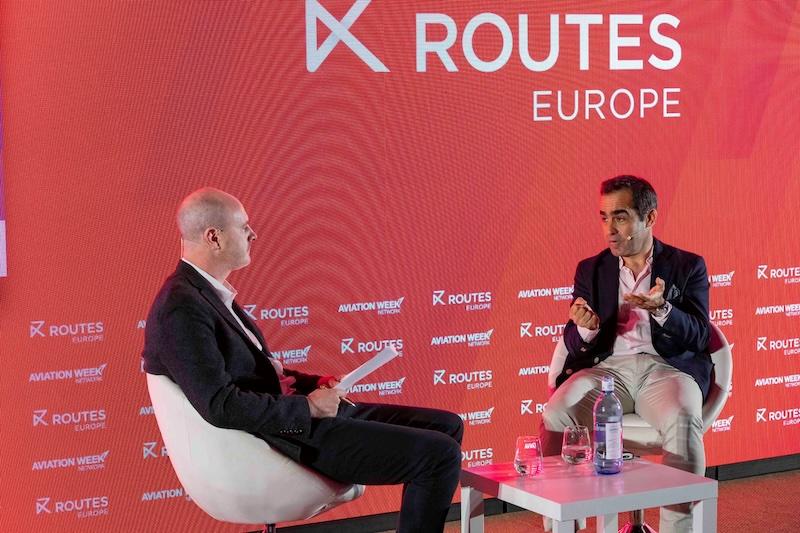
Volotea CEO Carlos Muñoz (right) at Routes Europe 2025.
Volotea CEO Carlos Muñoz says the Spanish LCC remains open to playing a role in Europe’s ongoing airline consolidation, despite the collapse of a proposed joint venture with Latin American airline group Abra.
The joint venture, announced in June 2024, was contingent on Volotea acting as a remedy-taker in the now-abandoned merger between Iberia parent International Airlines Group (IAG) and Air Europa. With IAG pulling its bid amid regulatory pushback, the deal collapsed in August 2024—and with it, Volotea’s plans to acquire divested slots at Madrid-Barajas Airport.
However, speaking at the recent Routes Europe 2025 event in Seville, Muñoz stressed that Volotea remains open to acting as a remedy-taker in Madrid should Air France-KLM or Lufthansa pursue a deal for Air Europa, as speculated.
“I think the number of remedies would be much smaller than what it was with Iberia-Air Europa,” he said. “So, would we be interested? Yes. We're also interested in other consolidating options to be a remedy provider. There are not many independent, midsized airlines in Europe—I think that's why the commission likes us for that role, and we like it, too.”
Muñoz said the tie-up with Abra would have offered “a formidable opportunity” that could have created a strong competitor in the Spanish market by combining Volotea’s short- and medium-haul operations with Abra’s long-haul capabilities.
Volotea had proposed basing up to half of its 40-strong Airbus aircraft fleet in Madrid—an airport that currently ranks as the airline’s 41st-largest by capacity. “It was not a minor thing,” Muñoz said. “It was a serious proposition.”
Despite the setback, he explained that Volotea remains agile and opportunistic. “We’re not dogmatic at all,” Muñoz said. “If there’s a good opportunity out there, we’ll go for it. It’s about becoming opportunistic—seeing what’s out there and moving in to take advantage of it.”
He added that Volotea is betting its size and flexibility will keep it relevant in future moves. “We’re small compared to Ryanair or easyJet, but definitely the most flexible,” Muñoz said, adding it remains on standby for the next consolidation window. “We’ll see how it all goes, but we’re ready.”
According to OAG Schedules Analyser data, Volotea is scheduled to serve 101 airports during the summer 2025 season, offering approximately 9 million seats. Muñoz said Volotea sees France, Italy and Spain as its biggest markets, but he also cited the fast-growing Greece market. The airline has a codeshare with Athens-based Aegean Airlines, which has a 17% stake in Volotea that could grow to 21%, Muñoz confirmed.





